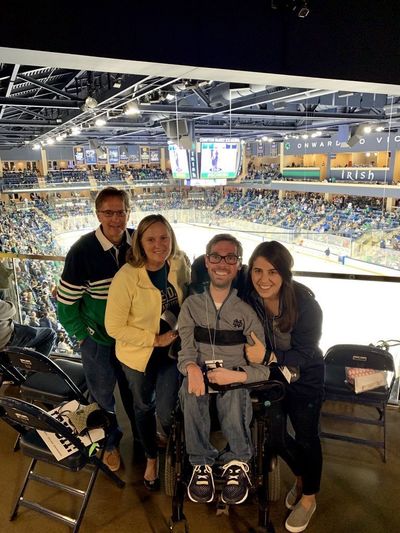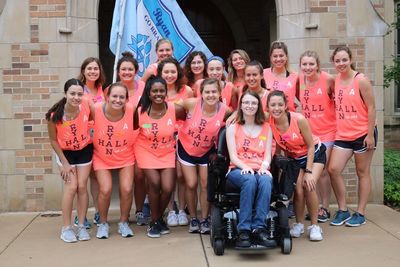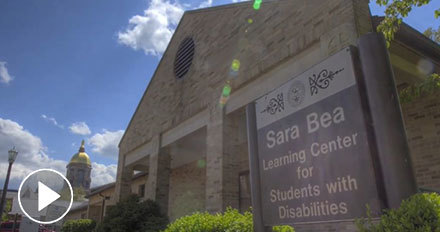
If there’s one thing Matt Swinton ’12 wants high school students with mobility issues to know it’s that going to college is possible. Living in a residence hall is possible. Making friends is possible. Living away from home is possible.
Getting what you need to make it happen is possible.
At Notre Dame, Swinton and his family have helped make sure of it. In partnership with the University, the Matthew Swinton Endowment for Excellence in Service to the Disabled provides funds that cover costs for admitted students with mobility differences to explore all Notre Dame has to offer—in person.
In addition to the usual curiosity about academics and campus life, students with mobility issues have a special set of criteria in mind throughout their college search.
Being able to easily navigate campus is key. For example, would a student using a wheelchair encounter a high curb on the way from their residence hall to a classroom building? Are sidewalks shoveled after a heavy snow?
“There’s only so much you can see from a brochure or a website,” says Swinton. “And it’s not easy for someone with a mobility impairment to just jump on a flight and go visit.”
So the Swinton endowment offers funding for admitted students to visit Notre Dame, along with a family member or caregiver, and see what it’s like for themselves.
Swinton understands students’ concerns from personal experience. He has a neuromuscular disease called spinal muscular atrophy and was never able to walk. He has used a motorized wheelchair since he was 18 months old.
As a high school senior, Swinton and his parents, who are from the Dallas-Ft. Worth, Texas area, had concerns about him going to college far from home. But a visit to the Notre Dame campus and a meeting with Sara Bea Accessibility Services convinced them it was possible.
“Obviously, [because I needed] some care and support at night and in the mornings, that presented some challenges with living in the dorms and Notre Dame was the only school to say, hey, we can do this and you can have roommates,” says Swinton.
In his first year, Swinton moved into a quad in O’Neill Family Hall, where he lived with two roommates.
Swinton’s parents arranged care from professional support staff through an agency who, unfortunately, proved undependable. But Swinton convinced them that his fellow Notre Dame students would be on hand to help. And they were.
After he sent an email to O’Neill residents requesting assistance, 11 hallmates showed up to his room that night. Swinton had all the help he needed and those hallmates are still some of his best friends.
“Some of my closest friends are the guys who were there to help me,” he says. “A lot of those guys made sacrifices in their own lives to make my experience equal to theirs.”
Swinton attended football games, dances, and other student activities, and he says students with mobility issues can do all that and more at Notre Dame.
“You’ve got to start thinking it’s possible,” he says.
Accommodations on Campus

Junior Monica Mesecar is a neuroscience and behavior major from West Lafayette, Indiana. She has cerebral palsy and uses a wheelchair to get around campus because of gait, balance, and endurance issues. She is also the founder of Access-ABLE, a club for students with disabilities and their abled allies.
In high school, Messcar used a walker and crutches, but knew she wouldn’t have the energy to traverse the Notre Dame campus with them, especially carrying a backpack, so she transitioned to a wheelchair.
“It was the best thing I could have done because it has allowed me to have so much independence,” she says.
Mesecar lives in Ryan Hall, considered to be one of the most accessible residence halls on campus. She loves it for that reason. Notre Dame parent and Trustee Emerita, Shirley W. Ryan gifted the hall to the University with accessibility in mind.
Mesecar’s room is probably her most significant accommodation at Notre Dame. She lives in a quad room, where she and one roommate live across a common room from two other roommates. Messecar’s room door can be unlocked and opened via remote, making it easy for her to go through in her wheelchair. Right off of the common room there is a handicapped-accessible bathroom.
Notre Dame students with disabilities register with Sara Bea Accessibility Services in order to arrange accommodations.
“Most students with mobility issues contact us prior to their applying,” says Program Coordinator Scott Howland.
He and his staff talk with prospective students and their families about the kinds of accommodations Notre Dame can provide. Once admitted, students work with the office to make arrangements that vary from residential accommodations to using Sara Bea’s testing center to complete exams.
Sara Bea coordinates with offices across campus to arrange accommodations, the goal being to allow the same access to courses, programs, and facilities that is experienced by students without disabilities.
For example, a student with a vision impairment might use notes taken by a student notetaker employed by Sara Bea. This accommodation allows them to study course content on their own time, just as other students do, regardless of a disability that prevents them from taking notes easily.
A Choice that Works for You
When choosing a college, Howland encourages students with mobility issues to focus on fit.
“I don’t want students to pick Notre Dame because of the accommodations that are provided, but to pick it because they want the same experience that other students are coming for,” he says.
Essentially, students should choose Notre Dame because they want the Notre Dame experience, and then make use of accommodations that can bring that dream possible.
Funds like the Swinton family endowment can help in the college search process.
“Definitely visit [college campuses] if you can,” says Mesecar. “See if you can navigate campus. If you’re having an impossible time, it may not be the school for you.”
But look closely at the culture of your top schools too, she says. If you want to be surrounded by people who understand and support you and your particular challenges, Mesecar advises, “[L]ook at the cultural attitude of your university toward people with disabilities. Do they have an attitude of inclusion?”
College choice is ultimately about feeling like the campus community is your community.

Learn More
Explore Sara Bea Accessibility Services and watch our video about services for students with mobility impairments.